Text

❝Making #dua for your #parents is one of the best, easiest prescriptions and a #remedy for an expansion of your #rizq
Every morning and evening make dua for them and watch the next day how your #wealth grows, how your #business runs smoothly and becoming prosperous.❞
— Shaykh Muhammad al-Yaqoubi
13 notes
·
View notes
Text
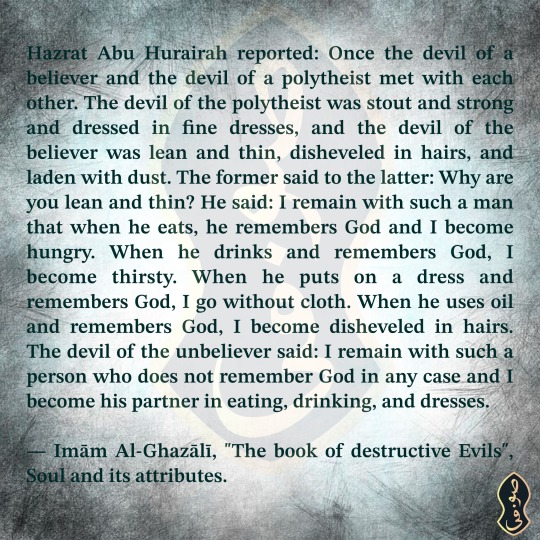
Hazrat Abu Hurairah reported: Once the devil of a believer and the devil of a polytheist met with each other. The devil of the polytheist was stout and strong and dressed in fine dresses, and the devil of the believer was lean and thin, disheveled in hairs, and laden with dust. The former said to the latter: Why are you lean and thin? He said: I remain with such a man that when he eats, he remembers God and I become hungry. When he drinks and remembers God, I become thirsty. When he puts on a dress and remembers God, I go without cloth. When he uses oil and remembers God, I become disheveled in hairs. The devil of the unbeliever said: I remain with such a person who does not remember God in any case and I become his partner in eating, drinking, and dresses.
— Imām Al-Ghazālī, "The book of destructive Evils", Soul and its attributes.
4 notes
·
View notes
Text
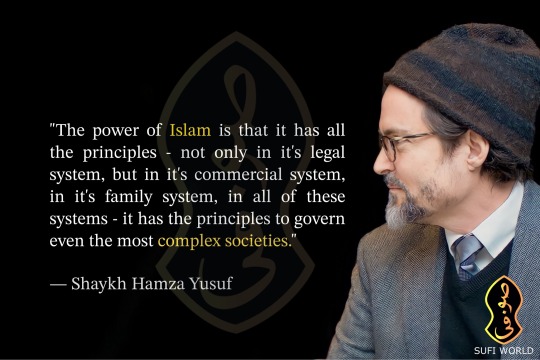
"The #power of #Islam is that it has all the principles - not only in it's #legal #system, but in it's commercial system, in it's #family system, in all of these systems - it has the principles to #govern even the most complex #societies."
— Shaykh Hamza Yusuf
#hamza Yusuf#sufi#islam#sufiworld#shaykh#scholar#sufi world#habib#love#sufism#scholars#power#society
4 notes
·
View notes
Text
The importance of saying “HASBUNALLAHU WA NI’MAL WAKEEL“ which means “Allah Alone is Sufficient for us and He is the Best Guardian, the Excellent Protector.”
— Voice of Shaykh Muhammad Metwalli Al-Sha’rawi
2 notes
·
View notes
Text

When Imam al-Hussain was fighting his tears were flowing and his sister asked, "Why are you crying?" I am sad for these people who are sending themselves to Jahannam (hell).
— Shaykh Dr. Muhammad al-Ninowy
#Ashura #Muharram #MartyrsofKarbala
#sufi#islam#sufiworld#shaykh#scholar#sufi world#scholars#habib#love#sufism#martyrs#imam Hussain#Karbala#imam Husain#martyrs of Karbala#ashura#muharram
13 notes
·
View notes
Text
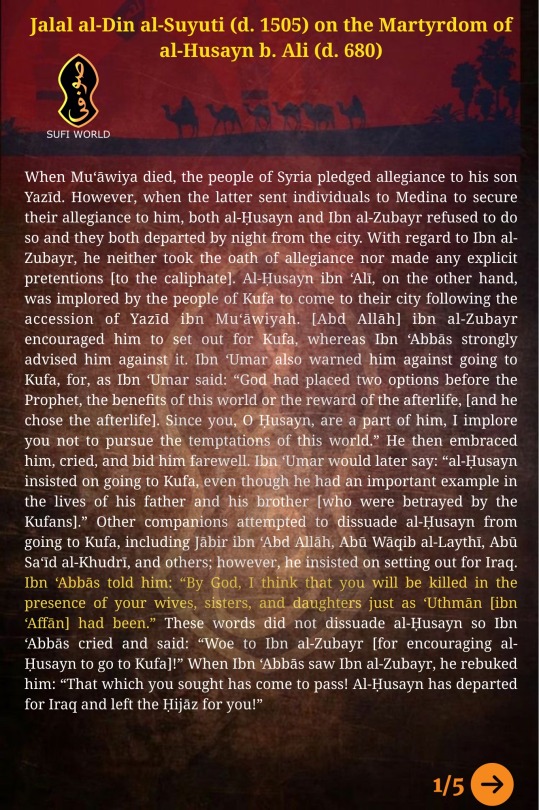



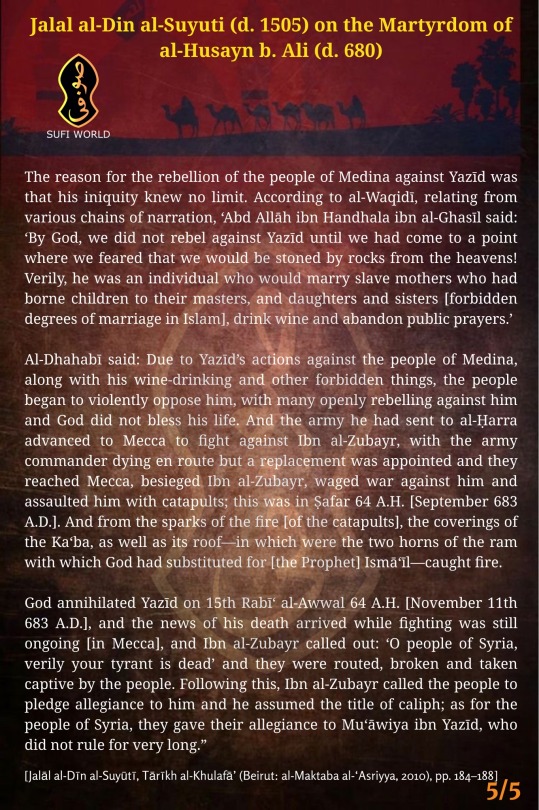
Jalal al-Din al-Suyuti (d. 1505) on the Martyrdom of al-Husayn b. Ali (d. 680)
2 notes
·
View notes
Text

The events which took place on Ashura remind us that all honour belongs to those beloved to Allah, even if the opposite appears to be the case.
The Messenger of Allah ﷺ is the most honourable of people in the sight of Allah, although he was the one who tied a stone to his belly out of hunger, he was the one who had camel’s entrails thrown upon him when he was praying and he was the one whose forehead was split and whose tooth was broken. All honour belonged to him while he was in the cave as the disbelievers searched for him.
All physical, material, and military strength was in the hands of Fir`awn, but all honour belonged to Sayyiduna Musa.
His people said to him:
“We are trapped!”
Musa said:
“No! My Lord is with me and He will guide me!”
Whoever wishes to abase those whom Allah has honoured will be abased, but whoever wishes to honour those whom Allah has honoured will himself be honoured.
When Sayyiduna al-Husayn was martyred, it was not he that was abased, but rather those that killed him. He attained the greatest honour from his Lord. His son, `Ali Zayn al-`Abidin, lived on to be the father of thousands of great imams. There is no honour in commemorating his martyrdom in a way that contravenes his way, the way of his father and the way of his grandfather ﷺ.
Whoever is killed for the sake of Allah will gain honour. Whoever is killed for the sake of something contemptible such as power, wealth and status, will be abased.
Through obedience to Allah, the slave honours himself. Through disobedience to Allah, the slave dishonours himself.
— Habib Umar bin Hafiz
1 note
·
View note
Text

—• The character of Imām Zayn al-'Ābidīn after Karbalā
"The character of Imām Zayn al-'Ābidīn (may Allah be pleased with him) transcendent in Husn al-Akhlāq — good conduct and moral excellence.
Once, Yazīd wished to kill one of his generals during the Battle of Karbalā (due to their personal enmity). The killer had no clue where to flee, so he fled to Madīnah. He stayed in the Court of the Imām for three days and enjoyed his hospitality. Imām Zayn al-'Ābidīn ordered the servants to feed him well and take good care of him. When the killer sought permission to leave, the Imām ordered his servants to load his ride with food and provisions; after all he had been the Imām's guest. When he stood up to leave, the killer could not move his feet. He thought that the Imām did not recognize him.
The killer, being shy of the mercy of Imām Zayn al-'Ābidīn, could not move forward. The Imām asked (politely): ‘Why aren’t you leaving?’ He replied, ‘I want to ask you one thing.’ The Imām allowed him to do so. The killer said: ‘It seems to me, O Imām, as if you haven’t recognized me.’
The Imām replied: ‘I recognize you since the day of Karbalā’. ‘If you recognize me since that day, why did you deal with me in this manner?’, the killer astonishingly asked. The Imām replied: ‘That was your character and this is our character! That was ‘you’, this is ‘us’!"
— Shaykh Dr Muhammad Tahir-ul-Qadri
#muharram1445 #yawmulashura #Muharram #Ashura #imamzainulabideen #ahlulbayt
3 notes
·
View notes
Text
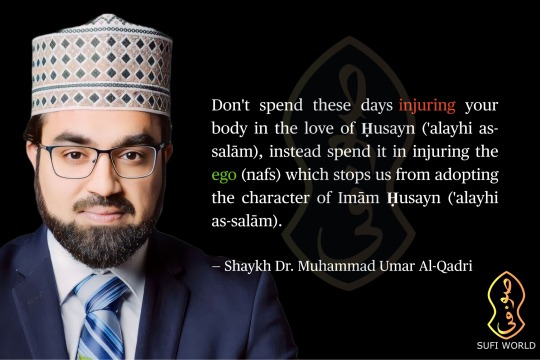
Don't spend these days injuring your body in the love of Ḥusayn ('alayhi as-salām), instead spend it in injuring the ego (nafs) which stops us from adopting the character of Imām Ḥusayn ('alayhi as-salām).
— Shaykh Dr. Muhammad Umar Al-Qadri
0 notes
Text

Events that happened on the 10th of #Muharram, Yawm al 'Āshūrā`.
#YawmAlAshura
#Ashura
#YawmulAshura
0 notes
Text

Not every expression of sadness, grief or fear is purely related to weak faith or certainty, there may be a time that Allah most high gives this state to a person to help them recover. On the contrary if such feelings were not experienced it would mean the person is ill, for example if a person has no fear of anything this is a sign of some form of mental illness; such a person would not be able to take defensive measures in order to protect themselves. Similarly, there can be states of sadness, grief or even anxiety that can be sent by Allah most high as a means to uproot and tend to that person’s grievance so they can recover to full health; had they not felt such sorrow and understood it, it could have led them to something worse.
In the life of the Prophet ﷺ, when Ibrahim may Allah be well pleased with him (the infant son of the Prophet ﷺ) passed away, a woman said ‘O Messenger of Allah you cry too’, however this grief that the Prophet ﷺ was experiencing wasn’t due to the displeasure in divine decree but it was an expression of mercy - a sign of healthy human emotion. We see in this the Prophet ﷺ acting in a way which is real for us, however what we have to be careful with when certain events take place inside our lives, is that we don’t allow those states of grief to prolong such that it becomes the default sate that we remain in. Instead, we continue to interact with people by smiling and having good character and not allowing our grief to invade in the way of our being.
Waking up before Fajr (the Dawn Prayer) even if you don’t pray, exposes oneself to divine gifts such that one would not be overwhelmed with grief. Wake up before Fajr even by a few minutes, to expose your heart and condition it with spiritual adrenalin that would allow you to look at the world with authentic optimism. The Prophetic advice we give people who are experiencing severe sadness is to - wake up before Fajr - and expose the hearts to these breezes. Just like the body inhales oxygen the soul requires spiritual oxygen present before Fajr.
— Habib Kadhim Al-Saqqaf
1 note
·
View note
Text
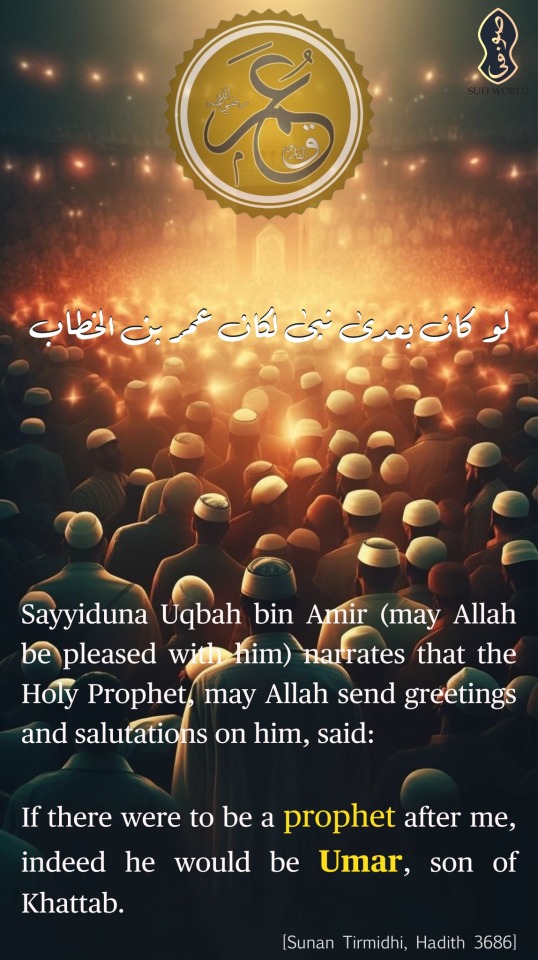
Sayyiduna Uqbah bin Amir (may Allah be pleased with him) narrates that the Holy Prophet, may Allah send greetings and salutations on him, said:
لو كان بعدى نبى لكان عمر بن الخطاب
If there were to be a prophet after me, indeed he would be Umar, son of Khattab. [Sunan Tirmidhi, Hadith 3686]
#Umar#Hazrat Umar#syedina umar#prophet#sufi#islam#sufiworld#shaykh#scholar#sufi world#scholars#habib#love#sufism#Sahaba
0 notes
Text

𝟭𝗦𝗧 𝗠𝗨𝗛𝗔𝗥𝗥𝗔𝗠 - 𝗬𝗢𝗨𝗠 𝗘 𝗦𝗛𝗔𝗛𝗔𝗗𝗔𝗧 𝗔𝗠𝗘𝗘𝗥-𝗨𝗟-𝗠𝗢'𝗠𝗜𝗡𝗘𝗘𝗡 𝗦𝗔𝗬𝗬𝗜𝗗𝗡𝗔 𝗨𝗠𝗔𝗥 𝗘 𝗙𝗔𝗥𝗢𝗢𝗤 (رضي الله عنه)
On this day, the 2nd Caliph of Islām, Sayyidunā 'Umar ibn al-Khaṭṭāb, left this world after being stabbed by Abū Lu'lu'a al-Majūsī while leading the Fajr prayer in the Masjid.
#muharram#Hazrat Umar#syedina Umar#Umar bin Khayran#sufi#islam#sufiworld#shaykh#scholar#sufi world#scholars#habib#sufism#love
0 notes
Text
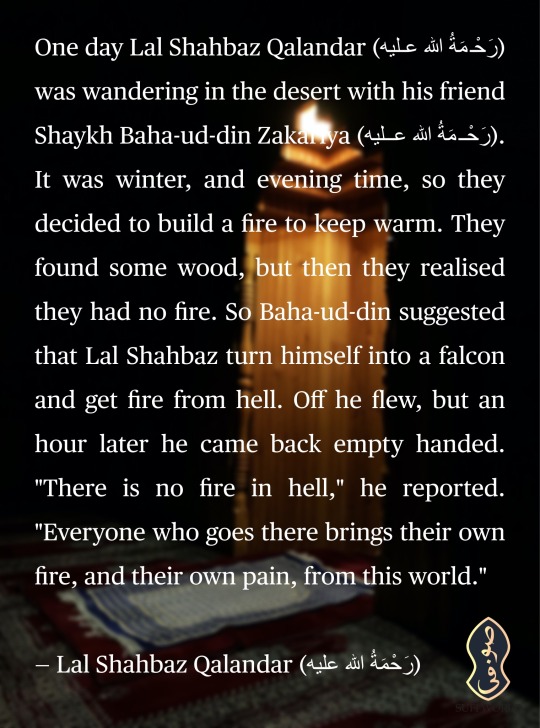
One day Lal Shahbaz Qalandar (رَحْمَةُ الله عليه) was wandering in the desert with his friend Shaykh Baha-ud-din Zakariya (رَحْمَةُ الله عليه). It was winter, and evening time, so they decided to build a fire to keep warm. They found some wood, but then they realised they had no fire. So Baha-ud-din suggested that Lal Shahbaz turn himself into a falcon and get fire from hell. Off he flew, but an hour later he came back empty handed. "There is no fire in hell," he reported. "Everyone who goes there brings their own fire, and their own pain, from this world."
— Lal Shahbaz Qalandar (رَحْمَةُ الله عليه)
#lal Shahbaz qalandar#bahauddin zakariya#sufi#islam#sufiworld#shaykh#scholar#sufi world#scholars#habib#love#sufism
2 notes
·
View notes
Text
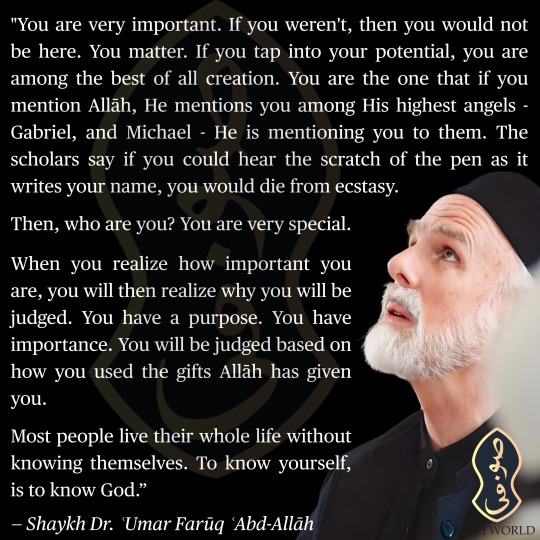
"You are very important. If you weren't, then you would not be here. You matter. If you tap into your potential, you are among the best of all creation. You are the one that if you mention Allāh, He mentions you among His highest angels - Gabriel, and Michael - He is mentioning you to them. The scholars say if you could hear the scratch of the pen as it writes your name, you would die from ecstasy.
Then, who are you? You are very special.
When you realize how important you are, you will then realize why you will be judged. You have a purpose. You have importance. You will be judged based on how you used the gifts Allāh has given you.
Most people live their whole life without knowing themselves. To know yourself, is to know God.”
— Shaykh Dr. ʿUmar Farūq ʿAbd-Allāh
4 notes
·
View notes
Text

"The beauty of the face does not help if the works are not beautiful."
If the works of that person are not beautiful, So don't measure people by how they look, measure them by what they do.
— Shaykh Muhammad Al-Yaqoubi
0 notes
Text

"Ustadha, we have not been sleeping together for years as my husband is turned off when he sees my stretch marks and scars."
"Ustadha, my husband scoffs at me whenever I undress in front of him as he said I have gained too much weight."
Ladies, you are beautiful. Allah made you beautiful. If anyone has a problem with your body then he has a problem with Allah.
Don't allow such men to define your beauty. Never be ashamed of your body.
They are the ones who ought to be ashamed of themselves.
I feel sorry for these men.
I feel sorry they are unable to see beyond the body that has borne them offspring who carry their names.
I feel sorry that they look at the stretch marks and scars as flaws instead of admiring them with gratitude.
Our Prophet ﷺ was 25 when He married a 40-year-old Hazrat Khadijah (رضي الله عنها) who had multiple babies before the marriage.
But look at his immense love towards his wife. Look at how He honoured and respected Her and never marry anyone else while He was married to Her. Look at how He praised His wife even after Her death and specifically mentioned that she was the one who gave birth to His children.
Just look at that. That is what you call manliness.
This is the real sunnah. Honouring, respecting and loving your wife is emulating the Prophet.
To men who love their wives for who and how they are, you have my utmost respect.
To those who have issues with your wife’s body and constantly mocking them, you may feel manly about that but the truth is, it is a sign of your sheer ignorance and weakness.
Just imagine if our mothers were more concerned about their bodies than to give birth to us. It's time we see these imperfections as perfectly perfect.
— Ustadha Shameem Sultanah
0 notes